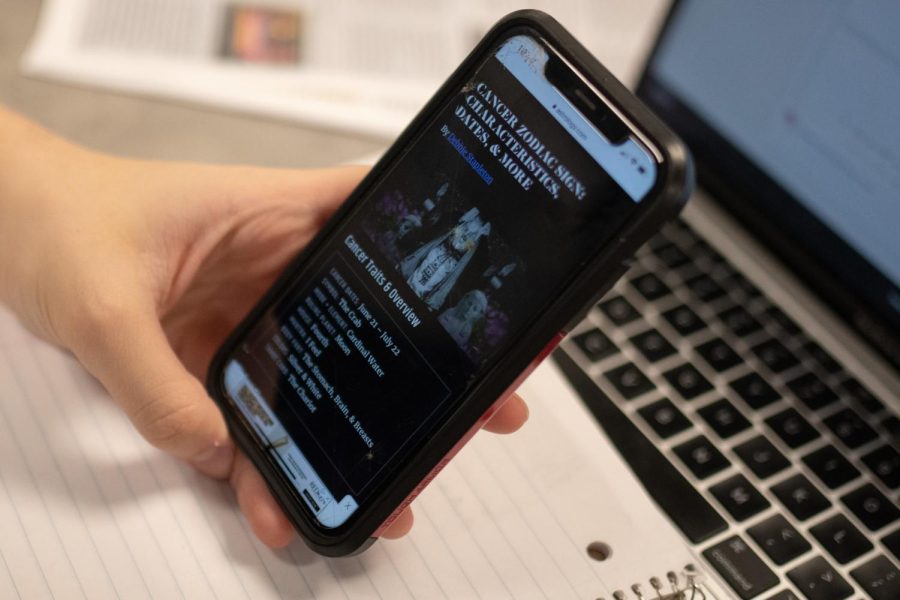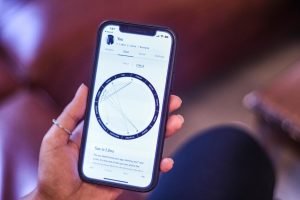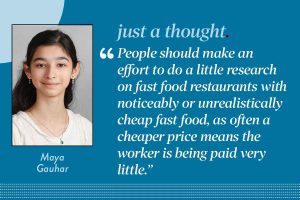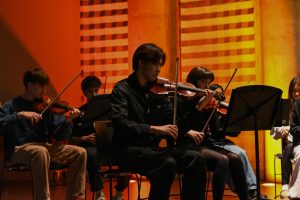Comforting vs. casual: Varying trust in astrology helps guide decisions, start conversations
While most members of the Lab community don’t wholeheartedly trust astrology, many appreciate it as an interesting subject and pastime.
March 22, 2023
Junior Kaavya Shriram was a baby when she got her first horoscope done, outlining specific aspects of her future. Before she was even born, her parents were married in the early morning because astrology told them it was an auspicious time.
As a Hindu, astrology has always been present in Kaavya’s life, and now, with the invention of apps like Co-Star and Nebula allowing astrology to become more mainstream, Kaavya enjoys the new — but perhaps less serious — form of astrology developing in America.
For many teenagers and adults alike, astrology is central to how they make decisions, view themselves and think about their future. For others, it serves as simply a conversation starter and a fun way to describe their personalities. While trust in astrology is varying, more and more people turn to the sky to seek concrete answers for what is otherwise uncertain.
Astrology has played an important role in senior Ava Wilczak’s life, ever since her mother introduced it to her at age 11. While she reads books about astrology recommended to her by trusted friends and used a website called Cappa Astrology to put together her first birth chart, Ava said she is less trusting of astrology apps.
“I feel like it’s kind of a double-edged sword,” Ava said, “because as I mentioned it is very popular on social media platforms so, without doing any other research with the apps, you don’t know who’s behind the apps or what sources they’re using.”
After her best friend introduced her to astrology, science teacher Elizabeth Hubin, a Capricorn, has a more lighthearted approach to astrology, enjoying the pieces of her birth chart she identifies with and using it to connect with others, while still retaining some skepticism.
“I would never make a major life decision based on my astrology sign,” Dr. Hubin said. “I probably wouldn’t even take my horoscope that seriously. Where I find more interest in it is conversations. If people know their sun, moon and rising, then it’s really fun to talk about those different elements and how they might identify with those pieces of their personality because it can just be like a helpful and revealing conversation starter.”
Kaavya said she has found that, although a lot of the concepts between Western and Vedic astrology are similar, she was thrown off by Western astrology when she compared her birth chart to that of her twin brother — born only a minute apart — and found that different websites produced varying results.
“I feel like Vedic astrology is just a bit more grounded for me,” Kaavya said, “but also I think that’s because I have a lot of family who genuinely believes in that stuff and takes it very seriously for, like, marriages — like that’s what they look at. So I don’t know if it’s actually more scientifically correct or whatever, or it’s just what I’m used to.”
While cosmology teacher Kevin Nihill doesn’t believe in astrology himself, he said he thinks it’s a fun thing to do, and briefly covers it in his class.
“It’s not by any means a big part of the course, but just where it comes from, what it means,” Dr. Nihill said. “People will know that they’re a Virgo or whatever but won’t actually know what that means star-wise, so it’s cool to talk about because astrology is a big part of culture, so it’s just fun to get a better sense of what that means.”
From basing important life decisions on astrology to laughing at funny astrology memes, this belief has provided comfort and security in what can be an otherwise confusing world.
“I think what’s really interesting about astrology is that it doesn’t just show you where you are in the moment, but it’s showing you where you’re going or who you’re essentially going to evolve into being,” Ava said. “I think that a lot of times it helps me specifically center myself and kind of ground myself.”





























































